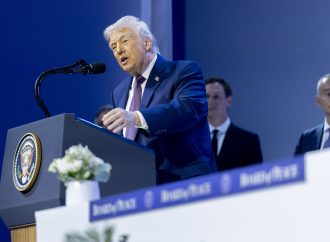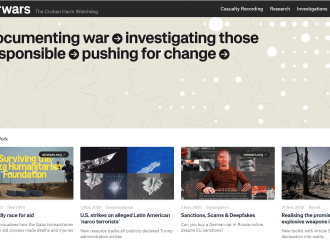Writing last week in the Globe and Mail (“Canada and the Middle East – A reality check”), Derek Burney and Fen Hampson aim to “set the record straight” regarding the Harper government’s diplomacy in the Middle East. Their effort to defend that policy, however, bends facts and distorts the “reality” they claim needs checking.
For a start, aid disbursements to the Palestinian Authority are weak evidence indeed for their claim that Canada is active in the Israel-Palestine peace process. That is especially true given that the government has repeatedly threatened to halt that aid for reasons that no one else but the Israeli government see as justified. No other examples of this “activism” are provided—unless, of course, the efforts being applauded are foreign minister John Baird’s consistent siding with the Netanyahu government even to the point of tacitly accepting its continued settlement construction, an activity that the UN, the US the EU and many Israelis believe undermines peace efforts.
Repackaging the foreign minister’s sound-bites about Canada’s Mideast policy as serious and informed commentary is unlikely to improve the factual record.
Burney and Hampson claim that Canada’s position to oppose Palestine’s acceptance by the UN as a permanent observer state is “strong and principled.” How that helps the peace process is not explained. Indeed, the government’s claim that UN recognition would undermine peace efforts is demonstrably false given that the current negotiations between Israel and the Palestinian Authority resumed after the UN vote was taken. They further parrot Baird’s absurd claim that the vote was a “unilateral” act when in fact the decision was made by some 140 states in the world’s most multilateral body, the UN General Assembly.
On Iran, Burney and Hampson suggest that Canada’s articulation of a “trust but verify” policy is somehow a unique and helpful reminder to those who brokered the November 24, 2013 initial nuclear agreement and are engaged in ongoing talks towards a final deal. But in fact verification has driven all the P5+1 talks with Iran, and is the policy at the core of the initial deal. It is hardly a Canadian contribution.
Canada’s Sharpest International Affairs Commentary
Don’t miss future posts on the CIPS Blog. Subscribe to our email newsletter.
Moreover, if “trust but verify” were actually Canadian policy, we would have warmly welcomed the November deal, as it strengthened verification measures. Instead, Baird damned the deal with faint praise and pronounced himself “deeply skeptical”. An honest appraisal of Canada’s position regarding the November deal would recognize that the Harper government, and Baird in particular, called it wrong. Indeed, an uncharitable assessment might even conclude that Baird at least would have been happier to see the talks fail, if only to justify Canada’s decision to break off diplomatic relations with Iran.
That policy is now exposed as misguided, since it creates innumerable obstacles to re-engagement with Iran at the precise moment that a more moderate government has taken power. Burney and Hampson say that “many others” are skeptical about the nuclear deal “including many Americans”; but it is hard to see virtue in the fact that our foreign policy is aligned with the Republican right and the Tea Party know-nothings in the US Congress.
Canada’s position on human rights in Iran is also cited as sound and “principled”. The government is right to lead efforts to censure Iran at the UN for its human rights record, as Canada has done for many years (including under previous governments).
But sadly, the alleged “principled” basis for the policy is increasingly in doubt, as it is implemented alongside a concerted effort to build relations with the Gulf monarchies (who are Iran’s enemies), without any public condemnation of their human rights record. This despite the fact that in these countries many of the human rights abuses cited in Iran—censorship, unfair trials, denial of free assembly and discrimination against women—are similarly present (if not all on the same scale). But Burney and Hampson applaud this obviously unprincipled diplomacy in the Gulf.
See also:
- David Petrasek, As Nuclear Talks Progress, Baird’s Concern for Human Rights in Iran Rings Hollow
- Roland Paris, Baird’s Tough Talk on Human Rights Rings Hollow in Bahrain
On other issues, such as wariness towards the rebels in Syria, Canada may have been right, but it is sidelined. We have made no significant contribution toward the ongoing UN and Arab League efforts to broker an end to the Syrian war. Baird refused a request for Canada to join virtually all of its European allies in petitioning the UN Security Council to refer the situation in Syria to the International Criminal Court, for no obvious reason other than ideological opposition to the Court’s gaining jurisdiction in that sub-region.
Aid to Syrian refugees in Lebanon and Jordan is welcome, and Burney and Hampson are right to point to the contribution. But again, a fair assessment would note that the government has done little to resettle Syrian refugees in Canada, only setting aside places for Syrians from the existing quota.
Finally the claim that on “human rights more generally” Baird is “front and centre in denouncing forced marriages of under-aged girls” is somewhat out of place, since although it is an important issue, it is not a pressing human rights concern in the Middle East. In that region, only Yemen is on the list of the twenty countries where girls are most at risk of under-age marriage.
Repackaging the foreign minister’s sound-bites about Canada’s Mideast policy as serious and informed commentary is unlikely to improve the factual record. And the blind support of such policies—even though it may launch a diplomatic career—hardly provides the reality check that’s needed.










